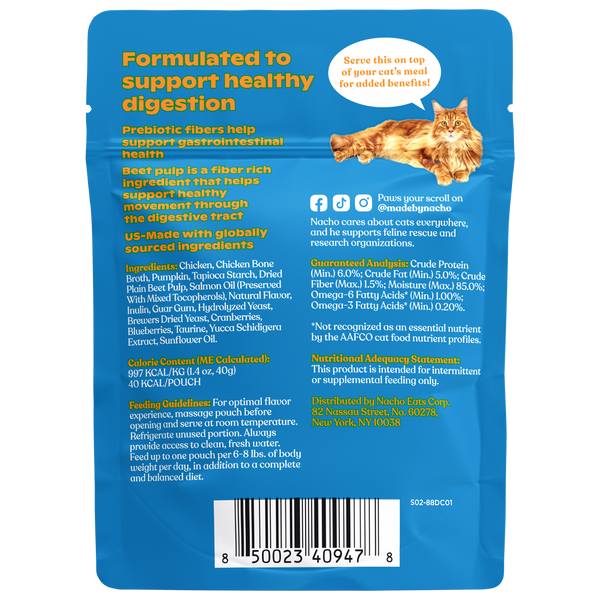Yes, nutritional yeast is safe for cats and can provide health benefits. It is a good source of vitamins and protein that can strengthen the immune system, promote skin and coat health, and boost your cat’s energy levels.
However, it is important to monitor your cat for any adverse reactions and consult with a veterinarian before adding it to their diet. While nutritional yeast can be beneficial, it should be given in moderation and not as a primary source of nutrition for your feline companion.
Always prioritize a balanced and species-appropriate diet for your cat’s overall well-being.

Credit: madebynacho.com
1. What Is Nutritional Yeast
Nutritional yeast is a type of deactivated yeast that is commonly used as a seasoning or food additive. It has a nutty, cheesy flavor and is often used to enhance the taste of various dishes. This yeast is an excellent source of several essential nutrients and is often sought after for its potential health benefits for both humans and animals, including cats.
1.1 Definition And Composition
Nutritional yeast is a species of yeast known as Saccharomyces cerevisiae. It is grown specifically for its nutritional value and is commonly found in the form of flakes or powder. The yeast is deactivated during processing, meaning it cannot be used for leavening. It is a complete protein, containing all nine essential amino acids necessary for feline health. Additionally, it is rich in B vitamins, including B12.
1.2 Nutritional Value
The nutritional value of nutritional yeast makes it a beneficial dietary supplement for cats. It provides essential vitamins and minerals, such as vitamin B and protein, which are crucial for maintaining a cat’s overall health. The inclusion of B vitamins in a cat’s diet supports various bodily functions, including skin and coat health, energy metabolism, and immune system function.

Credit: madebynacho.com
2. Nutritional Yeast For Cats
Nutritional yeast is gaining popularity as a dietary supplement for cats. It is a deactivated yeast that is sold in a powdered or flaked form and is known for its nutty and cheesy flavor. Many pet owners wonder about the benefits and risks of incorporating this supplement into their cat’s diet. In this section, we will delve into the various aspects of using nutritional yeast for cats.
2.1 Benefits Of Nutritional Yeast For Cats
Nutritional yeast offers several potential benefits for cats, making it an appealing addition to their diet:
- Rich source of vitamins and minerals
- Complete protein content
- Supports the immune system
- Promotes healthy skin and coat
- Provides an energy boost
2.2 Risks And Precautions
While nutritional yeast can be beneficial, it’s essential to be aware of potential risks and take necessary precautions:
- Allergic reactions such as excessive scratching, licking, and sneezing
- Possible gastrointestinal problems, leading to symptoms like vomiting, diarrhea, or lethargy
- Closely monitor your cat for any adverse reactions, especially when introducing it for the first time
2.3 Proper Usage And Dosage
When incorporating nutritional yeast into your cat’s diet, it’s important to follow proper usage and dosage guidelines:
- Start with a small amount and gradually increase to assess your cat’s tolerance
- Consult with a veterinarian to determine the appropriate dosage based on your cat’s individual needs
- Choose high-quality nutritional yeast specifically formulated for pets
3. Nutritional Yeast Recipes For Cats
Yes, nutritional yeast can be safely introduced into a cat’s diet. It is a good source of vitamins and protein, promotes skin and coat health, strengthens the immune system, and provides an energy boost for your feline friend.
3.1 Homemade Cat Food With Nutritional Yeast
Crafting homemade cat food with nutritional yeast can provide your feline friend with essential nutrients. Try this simple recipe:
- Mix cooked chicken or fish with a tablespoon of nutritional yeast.
- Add a small amount of cooked vegetables like peas or carrots for extra fiber.
- Combine all ingredients and serve to your cat for a nutritious meal.
3.2 Nutritional Yeast Treats For Cats
Creating nutritional yeast treats is a fun way to incorporate this ingredient into your cat’s diet. Here’s a quick and easy recipe:
- Combine canned tuna with a sprinkle of nutritional yeast.
- Form small bite-sized balls and place them on a baking sheet.
- Bake in the oven until crispy, then let them cool before offering them to your cat as a tasty treat.
3.3 Nutritional Yeast Supplements For Cats
Providing nutritional yeast supplements can enhance your cat’s overall well-being. Consider adding it to their diet in the following ways:
| Supplement Type | Benefits |
|---|---|
| Nutritional Yeast Powder | Supports immune system and promotes healthy skin. |
| Nutritional Yeast Tablets | Enhances energy levels and aids in digestion. |
FAQs For Is Nutritional Yeast Good For Cats
What Are The Side Effects Of Nutritional Yeast For Cats?
Nutritional yeast can cause allergy symptoms in cats such as excessive scratching, licking, skin redness, and sneezing. It may also cause gastrointestinal problems like vomiting, diarrhea, or lethargy. If your cat shows any reactions, stop using yeast supplements.
Is Nutritional Yeast Safe For Pets?
Yes, nutritional yeast is generally safe for pets, including cats. Monitor for any reactions when introducing it to their diet.
What Does Yeast Do For Cats?
Nutritional yeast provides vitamins and protein for cats, boosting their immune system and energy levels. It’s safe and beneficial when added to their diet.
Can Cats Have Braggs Nutritional Yeast?
Yes, cats can eat Braggs nutritional yeast. It can provide nutritional benefits and be added to their meals.
Conclusion
If considering nutritional yeast for your cat, monitor for any adverse reactions carefully. Consultation with a vet is advised before making dietary changes for your furry friend. Remember, each cat is unique, so proceed cautiously and with their well-being as the top priority.

